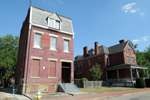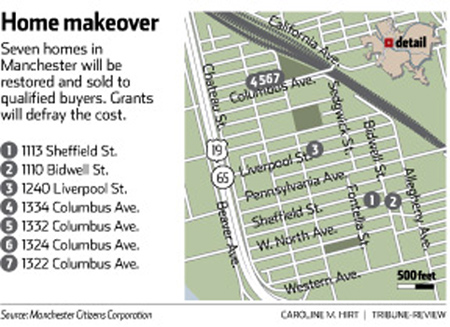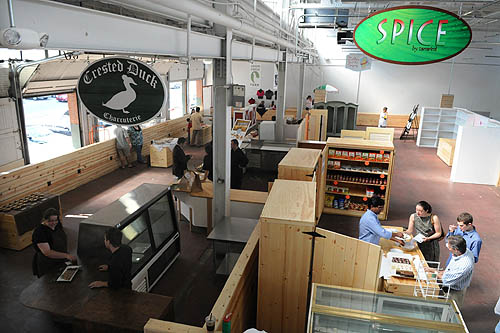
Category Archive: Historic Properties
-
The Pittsburgh Public Market Celebrates its Grand Opening this Friday
Wednesday, September 08, 2010
Pop City Media
If you haven’t been to the Pittsburgh Public Market in the Strip District, which opened softly on September 3rd, be sure to check it out this Friday, September 10th for the official grand opening. The 10,000 square foot space, which hosts over 40 vendors, is the first public market in Pittsburgh in 45 years.
The market features a diversity of small booth vendors, ranging from big name local operations wanting to fill a specific niche market to energetic startup operations hoping to make a name for themselves by virtue of the $25 per day rents. East End Brewery, for example, will be selling growlers to go. Be sure to pick up Indian seasonings or a meal-to-go from Spice by Tamarind, cure your sweet tooth at the Pittsburgh Candy Company, and grab some of the unique cured meats offered by the Crested Duck Charcuterie. There’s more to the market than food though, with booths like the crafty Babouche, and boutique skin care product vendor Tracy’s Treats.
The Pittsburgh Public Market is the brainchild of Neighbors in the Strip, which established a separate non-profit entity called the Strip District Market Counsel to run the operation. Plans for the market have been in development since 2003, and after extensive fundraising to the tune of $1.3 million and renovation work by architect Robert Indovina, the long awaited market is finally ready to become Pittsburgh’s next major tourist attraction, small business incubator, and community resource.
The market is located in the Produce Terminal Building near 17th and Smallman Streets. The grand opening ceremony will begin at 9 am this Friday. The first 100 visitors will receive a free tote bag, and a variety of entertainers and surprises will fill the building throughout the weekend. We can’t wait!
Sign up to receive Pop City each week.
Source: Becky Rodgers, Executive Director of Neighbors in the Strip
Writer: John FarleyPhotograph copyright John Farley
-
Denis Theatre Foundation Completes Sales Agreement of Historic Mt. Lebanon Movie House
Wednesday, September 08, 2010
Pop City Media
On August 31, a sales agreement was reached between the Denis Theatre Foundation, and the previous owners, D. and Neeta Raja for $668,750. The sales agreement is good cause for celebration, as the fate of the beloved historic Mt. Lebanon theater has hung in the balance since it closed in 2004.
Last October, the Denis Theatre Foundation entered into a purchase agreement with the Raja’s. Since then, their fundraising efforts brought in $100,000 from the Pittsburgh Foundation, many smaller funds, and a $155,000 matching grant from an anonymous donor. Anxiety built as the June 30 deadline approached to match the grant, but due to two extensions, the match was finally made, totaling the funds raised to $663,000.
Since executive director Anne Kemerer stepped down last month for personal family reasons, board member Jennifer Smokelin has been the acting executive director. The Foundation is currently seeking a permanent director. Smokelin is proud of the sales agreement, but acknowledges much work needs to be done.
“We have a capital campaign of $2.5 million to update and renovate the heating, air conditioning, the roof, and open one of the screens, the Encore Theater. Purchasing the theater is certainly a huge milestone, don’t get me wrong, but it is a portion of what it is that we need to do,” says Smokelin.
The Encore will be the first of three screens, and the Denis Theater Foundation expects it to be open by 2012, but they have a number of exciting plans for the theater’s future.
“We want to keep an homage to the original use of the theater, but also it’s going to be a community cultural center. So, it will show foreign language and documentary type film, but it will also have lecture venues, we envision poetry readings, and meeting rooms for cultural events, so it’s much more than the single screen movie theater that it was when it opened in 1938,” says Smokelin.
Sign up to receive Pop City each week.
Source: Jennifer Smokelin, acting executive director of the Denis Theatre Foundation
Writer: John FarleyImage courtesy The Historical Society of Mt. Lebanon
-
With New Pittsburgh Public Market, City Has Tradition Back
By Margaret Harding
PITTSBURGH TRIBUNE-REVIEW
Tuesday, September 7, 2010
Rosemary Miller, left, of Baldwin and Kelly Miller of Polish Hill, center, talk to Nathan Holmes at his Clarion River Organics booth at the new public market in the Strip on Friday afternoon. Justin Merriman/Pittsburgh Tribune-Review
Visiting the Pittsburgh Public Market the first day it opened took Augie Barrante back more than 60 years.
“I used to work in the old North Side Market when I was 10 years old,” said Barrante, 73, of Wexford. “I helped out with the produce stand.”
The opening weekend of the Pittsburgh Public Market in the Produce Terminal Building along Smallman Street was nothing short of an overwhelming success, with an estimated 6,500 visitors, organizers said.
“I thought there would be 100 people (Friday), and there were 100 people in the first hour,” said Becky Rodgers, executive director of Neighbors in the Strip. “I think everyone coming through is happy to have a market back.”
The market had a “soft opening” last weekend. Its official opening is set for Friday. More than 40 vendors are expected to participate each week, Rodgers said.
“It’s so contemporary,” said Lori Barrante, 54, Augie’s wife. “It has a little bit of everything.”
Pat Cosmano’s booth of olive oils and balsamics, Cosimano e Ferrari, particularly piqued the Barrantes’ interest.
Cosmano, of Rochester, N.Y., said he has worked out of a space at the Rochester Public Market for about eight months and expanded to Pittsburgh after a relative told him about the Strip District market.

The opening weekend of the Pittsburgh Public Market in the Produce Terminal Building along Smallman Street was nothing short of an overwhelming success, with an estimated 6,500 visitors, organizers said. Justin Merriman/Pittsburgh Tribune-Review
“I’m really impressed with the setup,” Cosmano said. “You have a lot of good vendors in here.”
The Rochester Public Market has about 300 booths in an indoor-outdoor setting. It won the 2010 America’s Favorite Farmers Market contest.
Rodgers expected at least 10 more booths to go up for this weekend’s opening.
“For a lot of people here, this is their second business,” Rodgers said.
Nathan Holmes helps run Clarion River Organics, a business cooperative in its third year that was selling vegetables and dairy products. Holmes said the group will bring in homemade ice cream, milk, meat and some vegetables in the winter.
“It’s really nice to have a place with a cooler,” Holmes said. “It’s exciting and people are excited.”
Teresa and Don Orkoskey of Lawrenceville said the setting reminded them of the market they grew up with in Wheeling, W.Va.
“I like the farmers’ stands,” said Teresa Orkoskey, 29. “It’s protected from the elements, but it doesn’t have that corporate shopping mall feel.”
Pittsburgh Public MarketWhere: Produce Terminal Building, Smallman Street, Strip District
What: Vendors selling items ranging from pierogies, espresso and Italian ice to textiles, olive oils and desserts
Open: Year-round, 9 a.m.-7 p.m. Fridays, 9 a.m.-5 p.m. Saturdays, 10 a.m.-4 p.m. Sundays
Details: pittsburghpublicmarket.org
-
Denis Theatre in Mt. Lebanon Won’t Be Silent Screen Too Long
By Rick Wills
PITTSBURGH TRIBUNE-REVIEW
Thursday, September 2, 2010A group working to renovate and reopen the Denis Theatre in Mt. Lebanon signed a sales agreement Wednesday to buy the building.
The Denis Theatre Foundation agreed to pay $668,750 for the theater on Washington Road. The theater, which opened 72 years ago, closed in 2004.
The deal should be final within 60 days, said Anne Kemerer, the foundation’s executive director.
“This is almost like an unattainable dream, especially after the economy got bad and fundraising became so difficult,” Kemerer said. “To me, a main street has a theater on it.”
The foundation has raised $663,000 and aims to raise another $1.8 million for the first phase of the renovation, which includes opening one screen, updating or replacing basic systems and installing an elevator.
The Encore, the first of three planned screening rooms, is expected to open in 2012.
The project’s second phase includes opening two more screens, restoring a stage in one theater and adding meeting rooms.
So far, the foundation has received 436 donations — the two largest are $155,000 from an anonymous benefactor and $100,000 from The Pittsburgh Foundation.
“The goal of this project is to serve a wide demographic over the South Hills. There is something about a community theater that makes a community stronger,” said Mark Lynch, a spokesman for the foundation.
The Denis opened in 1938.
“I remember standing in line to see ‘Benji’ there. The Denis Theatre is an historic building that holds lots of nostalgia for people in the area,” said Jennifer Smokelin, a foundation board member and Mt. Lebanon resident.
-
Work on Former Hollow Tavern Progressing
By Jewels Phraner
LIGONIER ECHO
Thursday, September 2, 2010
Fred Haeflein works on reviving the Hollow Tavern on Route 30 outside of Ligonier. Jared Wickerham | Tribune-Review
Saving Sleepy Hollow hasn’t gone exactly the way owner Fred Haeflein expected.
He’s had a skilled crew at work rebuilding the log landmark, but now he’s looking for a good chef and manager to operate the restaurant.
After an arson destroyed the building in February 2008, causing so much damage that Unity code enforcement officer Merle Musick condemned the property, Haeflein bought it with the intention of restoring it.
Financial troubles plagued the project early on, and this summer Haeflein said he has struggled to find the right person to run the restaurant. Although he has fond childhood memories of the restaurant, he has no interest in running the facility once it’s finished.
“I don’t cook. I’m not a restaurant manager,” Haeflein said. “I build things. I save things. I just want this building here.
“I need a good restaurateur – no, I need a great restaurateur – to keep this place running for a long time,” he said.
When the project ran into financial problems in early 2007, The Progress Fund, a Greensburg-based nonprofit lending organization approached Haeflein about a loan.
“That valley is so great. So many people enjoy driving through it. And we thought it would be a nice venue for people to stop and enjoy the valley,” said David Kahley, chief executive officer for the organization, which focuses on tourism-oriented projects.
Project loan officer Bob Patter said that while people might not see progress as they drive by the building, that doesn’t mean work isn’t being done behind the scenes.
“It’s still a very active project,” he said. “Fred is moving forward with it. Perhaps not at the pace everyone would like to see, but he’s trying to find the right person to run the restaurant for him.”
Haeflein said he expected to buy exterior logs for the building. But he wasn’t able to find the correct size and had to custom-make them instead.
“I wanted them to be as close to the original (Sleepy Hollow) as possible, and you just can’t buy logs that width anymore,” he said.
So Haeflein spent part of the summer using an ancient mill in his New York shop to cut logs, then transporting them to Ligonier.
“This is probably a lot like how the original logs were made,” he said. “It’s a pure miracle that (the mill) actually worked. That mill is probably as old as this building and hasn’t been used in 20 years.”
For now, only a few logs are secured to the building, but Haeflein said he will be back to finish the job soon.
Kelly’s Sleepy Hollow LLC was formed by Haeflein and his brother, Rich, who have been restoring the landmark west of Ligonier for about two years.
Edgar Wiltrout of Ligonier is serving a 10- to 28-year prison sentence for torching the restaurant and tavern on Feb. 23, 2008, because the former owner owed Wiltrout $1,000 and fired his girlfriend as a cook.
-
7 Homebuyers Sold on Manchester Vision
By Adam Brandolph
PITTSBURGH TRIBUNE-REVIEW
Thursday, September 2, 2010
Linda Nelson, chairwoman of the Manchester Citizens Corporation, inspects one of the properties being restored on Columbus Avenue in Manchester. The home was purchased as part of the Great House Sale. Jasmine Goldband | Tribune-Review
For the first time in years, Anthony Clark sees a reason to invest in his North Side neighborhood.
“Manchester is really starting to get going, and after 15 years of renting, I think it’s a good time,” said Clark, 44. “I think we’re about to see some really great things.”
For years, the city demolished vacant homes in Manchester, turning usable buildings into weed-filled lots that became overrun with graffiti and trash. The vacant lots made selling homes difficult, and people living there say the community suffered despite the fact that police records show the number of crimes fell by nearly half over the past decade.
“When you have a tooth out, the disease begins to spread,” said Linda Nelson, chairwoman of the Manchester Citizens Corporation, a community group founded in 1965 that helped spur more than $40 million in developments and initiatives. “If (buildings) come out, it’s definitely a hindrance. If we can renovate them, it’s a plus.”

An abandoned structure (left) on the 1100 block of Bidwell Street in Manchester is one of several slated for rehabilitation. Jasmine Goldband | Tribune-Review
With the group’s managing director Stanley Lowe urging the city to save buildings from demolition, the wrecking ball slowed. Along with the Pittsburgh History & Landmarks Foundation, it identified 110 buildings that should be saved, 63 of which are considered a priority.
Lowe said he reminded members of the city’s Historic Review Commission about the neighborhood’s rich architectural and cultural heritage, which helped Manchester achieve city and national historic status in 1979.
“Once you tear down the building, you can never go back,” Lowe said.
In October, the citizens’ group showcased seven homes to be restored by March. More than 100 people, some from as far away as Venezuela and Colombia, attended a two-day session that included a seminar educating them about how to buy one of the homes.
Twenty-five people put down $1,500 deposits, and seven qualified buyers were chosen at random to buy the homes. The rest were put on a waiting list for future restorations.
“The homes were a terrible mess,” Nelson said. “But the people who came in saw our vision.”
The cost to restore each home will range from $150,000 and $450,000, but they will sell for $90,000 to $200,000.
Incentives totaling $2 million for the buyers will be paid by grants from the city’s Urban Redevelopment Authority, the federal Department of Housing and Urban Development, Allegheny County, the Pittsburgh History & Landmarks Foundation’s Landmarks Community Capital Corporation and the Allegheny Foundation.
City Councilman R. Daniel Lavelle, whose district includes Manchester, said the strategy “fits the city’s economic reality.”
“The city can’t afford to do it all at once, so (the citizens’ group has) identified key properties they want to save,” Lavelle said. “I think it’s a tremendous project.”
Preserving the “architectural fabric” of the historic district has been ongoing since the 1970s, said Arthur Ziegler, president of the landmarks foundation.
Rob Stephany, executive director of the redevelopment authority, said the restorations are a “really bright strategy,” especially because they’re near construction at Columbus Square, a $15 million, 31-home development on four acres.
“Manchester has everything working for it,” he said.
-
Downtown’s EQT Plaza No Longer on the Block
‘Recapitalization’ shinier than sellingWednesday, September 01, 2010By Mark Belko, Pittsburgh Post-GazetteThe owner of one Downtown building has removed its “for sale” sign.
Rather than sell, New York-based Blackstone Group has decided to retain ownership of EQT Plaza, formerly known as Dominion Tower, and refinance its debt.
“They just decided with the way the markets are today, a recapitalization was a better option for them,” said Gerard Sansosti, executive managing director of HFF Inc. in Pittsburgh, which was marketing the building for sale.
Aaron Stauber, president of New York-based Rugby Realty, which has extensive property holdings in Pittsburgh, said refinancing was an attractive option for building owners these days because of very low interest rates. One advantage to refinancing rather than selling, he noted, is that the owner does not have to pay capital gains taxes.
HFF had announced in February that it was putting the 32-story office building, now the headquarters of EQT Corp., up for sale on behalf of Blackstone, which bought it for $45 million through a sheriff’s sale in 2005.
While HFF had received offers for the 23-year-old building, located on Liberty Avenue, Mr. Sansosti said Blackstone ultimately decided not to sell.
“I think it’s going to be off the market for a while,” he said.
As of February, the 615,942-square-foot office tower was about 96 percent leased. EQT moved into the building from the North Shore last year.
EQT Plaza was one of a handful of high-profile buildings Downtown to go up for sale this year, sparking a wave of publicity and even inquiries from city hall about the reasons for the moves.
Others on the market include the landmark Macy’s department store (formerly Kaufmann’s); the four-building Gateway Center complex, the linchpin of the city’s first renaissance; the Henry W. Oliver Building; the Regional Enterprise Tower, formerly the Alcoa Building; and American Red Cross of Southwestern Pennsylvania building, Boulevard of the Allies.
-
City’s Newest Indoor Market Opens in Strip Next Week
Wednesday, September 01, 2010By Diana Nelson Jones, Pittsburgh Post-GazetteWhen the Pittsburgh Public Market in the Strip opens Friday, patrons will see some tried-and-true faces — La Prima Coffee, the Common Plea and Fudgie Wudgie among them.
But the new indoor market in the Produce Terminal Building on Smallman Street marks the retail debut of a number of the 43 vendors, whose wares will include organic produce, coffee, specialty meats, pastries, Indian food, pierogies, organic teas, local wines, micro brewed beer, skin care products, knitted goods and jewelry.
The Produce Terminal was built in 1926 by the Pennsylvania Railroad. The market house, located between 16th and 17th Streets, features horizontal roof-line skylights and doors that open for a river view. It will be open Fridays from 9 a.m. to 7 p.m., Saturdays from 9 a.m. to 5 p.m. and Sundays from 10 a.m. to 4 p.m. The grand opening festivities are Sept. 10-12.

Debbie Jacknin of Jenn's Jems displays her jewelry and other items in her booth at the new Pittsburgh Public Market in the Strip District on Tuesday. Robin Rombach/Post-Gazette
The project began almost nine years ago as a dream of Neighbors in the Strip.
“Eight years, three months and two days,” said Tom Goslin, the Market Council president and owner of American Dispatch.
The dream got state funding in 2005, the same year the Urban Redevelopment Authority, which owns the building, did a feasibility study. The URA invested $100,000. The total price tag of $1.25 million was filled out by federal, state and local foundation money.
“This was part of our neighborhood improvement strategy,” said Becky Rodgers, executive director of Neighbors in the Strip. “It’s been a goal of ours to bring back a piece of history to Pittsburgh.”
The city once had four enclosed marketplaces. The last of them closed in 1965 to create Allegheny Center Mall.
Several years ago, the board of Neighbors in the Strip visited existing markets: the Reading Terminal Market in Philadelphia, the West Side Market in Cleveland and the Central Market in Lancaster, hoping to bring a similar concept to the Strip.
Cindy Cassell, market manager, said the market council selected vendors “in the context of the entire Strip. We had a series of meetings with existing businesses and came up with a list of things that would contribute the most diversity to the Strip.”
Edith Davis and Eartha Sewell, of Edith and Eartha Textiles, are among several woman- and minority-owned businesses in the marketplace. They were in a knitting group, then started knitting together, specializing in scarves and wraps.
“People said they wanted to buy them” said Ms. Sewell, “so we thought we could make a business out of it. Then this opportunity came up. You know what they say: Do what you love.”
The first vendor’s space in the markethouse is Kevin and Adam Costa’s Crested Duck Charcuterie, where the brothers are opening their first specialty meat shop. Kevin was mentored by a chef during a stint in Cincinnati, “then I just played with it and tried things. I did vegan baking at a farmer’s market in Indianapolis” before returning home to Pittsburgh last year.
Debbie Jacknin’s 23-year-old daughter Jenn began making jewelry when she was 14. “She taught me,” said Ms. Jacknin. “We’ve done craft shows before but nothing like this,” their first retail presence — Jenn’s Jems.
“A friend told me about this marketplace. I had to submit a video. And they accepted us.”
Diana Nelson Jones: djones@post-gazette.com or 412-263-1626.




